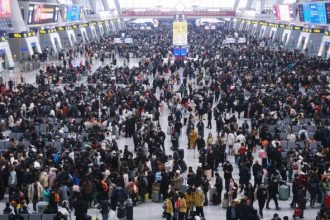A favorable tropical climate all year round, an abundance of natural resources, and local authorities’ prioritization of sustainable farming practices are driving Vietnam to become an increasingly popular destination for U.S. manufacturers to source high-quality agricultural produce, ranging from rice, green coffee, cashew to walnuts.
The domestic agricultural sector in Vietnam has experienced the highest growth, reaching 3.36% in 2022, compared to the past three years, Ministry of Agriculture and Rural Development (MARD) stated earlier, thanks in part to local government funding and incentives.
According to Census Bureau, the U.S. is one of the top trading partners with the Southeast Asian country, and has recently surpassed China and Cambodia to become Vietnam’s largest business associate in the agricultural industry with an export turnover of $10.8 billion.
Shifting Narrative For Vietnamese Coffee
To understand how Vietnamese products have become the new premium to the U.S. consumer, look no further than the recent rise of Vietnamese coffee exemplified by Nguyen Coffee Supply: Founded by first-generation Vietnamese American, Sahra Nguyen, in 2018, the company launched with a mission of expanding the Vietnamese coffee experience by sourcing primarily robusta beans from the country, a variety that’s high in caffeine and antioxidants, yet had a hard time gaining recognition from the specialty coffee industry in the past.
“Nguyen Coffee Supply has really been pioneering the Vietnamese coffee category… through challenging the dominant narrative and being proud in our stance to reclaim and elevate robusta coffee,” Nguyen wrote me via email. “While it’s well known that many companies use robusta coffee in their products, they don’t mention robusta specifically as they would with arabica beans; the value of transparency was not being equally applied across both coffee species, which ultimately perpetuated the dichotomy and rendered robusta coffee invisible.”
Before Nguyen Coffee Supply’s launch, the general perception of Vietnamese coffee was conflated with “a sweet and strong drink with an excessive amount of sweetened condensed milk,” Nguyen noted. Over time, that perception started to shift with amplified consumer education on robusta’s unique attributes, 60% less sugar for example, and their strong environmental resilience amid climate change.
Sustainability plays a major role in driving interest in growing more robusta beans, and Vietnam accounts for more than half of the global robusta supply. “Arabica is no longer enough to satisfy appetites, and Vietnamese robusta, everyone knows, is number one in the world.” Vietnam’s Coffee and Cocoa Association’s chair, Nguyen Nam Hai, was recently quoted saying.
Robusta coffee indeed serves as a quintessential part of Vietnamese culture and social life to a degree that international coffee behemoths are scrambling to compete domestically: Vietnam has 0.9 Starbucks
SBUX
The U.S. consumer interest in Vietnamese coffee is also heating up evidenced by Nguyen Coffee Supply’s 1,100% year-over-year growth in retail distribution across Whole Foods Market
WFM
“The category is just emerging in the U.S. market,” she said. “For us, it’s all about growing the pie, not going after each other’s slices, and if categories like matcha and boba are any indication of how big this pie can become, we have plenty of room for everyone.”
Switching To High-Value Crops
Additionally, a cost efficient labor market and close ties with the U.S. are also luring American CPG operators to increasingly capitalize on Vietnam against a backdrop of elevated tensions between Washington and Beijing which are pushing the U.S. to outsource manufacturing and suppliers outside of China, making Vietnam a convenient alternative.
“When we went to Vietnam and spoke to the local people, they seem to really love the idea of working with Americans, and it was such a two-way street of gratitude,” said Dominic Purpura, founder and CEO of rapidly growing premium watermelon juice brand, Mela. “As a country, it seems like Vietnam is really keeping their head down and focusing on growing themselves from a GDP and business perspective. There doesn’t seem to be too much drama politically, which allows us, as a company, to feel less stressful and more secure.”
Watermelons are a lucrative crop across Vietnam with the fruit taking on average 50-60 days from planting to harvest — much shorter than the time needed for other key export produce, such as rubber plant, to mature, typically between 10-15 years.
As a result, farmers residing along the Mekong Delta are converting their low-yield rice fields to growing high-value crops instead, such as mango, jackfruit, coconut, in addition to watermelons. Department of Agriculture and Rural Development in Dong Thap Province estimated these produce offer local farmers up to VND 200 million, about $8,200 in total profit per hectare a year.
The nutrient-rich sediment accumulating in the Mekong Delta is not just nourishing a plethora of nearby agricultural corps; the river also serves as a natural canal for transportation. In the rural Mỏ Cày Nam district of Bến Tre Province, a well-known coconut producing region just 80 miles south of Ho Chi Minh City, farmers are seen handpicking and later transporting a batch of around 100 husked coconuts by boat.
“The waterways of the Delta provide all we need,” said Anthony Cadieux II, who cofounded ultra premium coconut water company CoAqua with Justin Bruckel. “The coconut farm utilizes canal ways to move fresh coconuts across thousands of acres to where they are processed in Ho Chi Minh City.
Cadieux added: “On our farms, you won’t find any commercial pesticides, nutrients or heavy gas guzzling machinery.” Coupled with their unique processing of heating up the fresh coconut water to a higher-than-usual pasteurization temperature for an extended period of time, the result is a more caramelized taste and smoother mouthfeel. CoAqua’s premium proposition has also driven the brand to grow 400% in sales year-over-year across approximately 2,500 U.S. retail stores, notably Sprouts and Wegmans, and the company anticipates further distribution gains in hospitality and food service.
“In my opinion, Vietnam has become a source of premium ingredients due to the country’s emphasis on sustainable farming practices.” Cadieux said. “What also stands out is the pride the Vietnamese people take in producing the highest quality fruits, vegetables, and other agricultural products.”
Read the full article here





